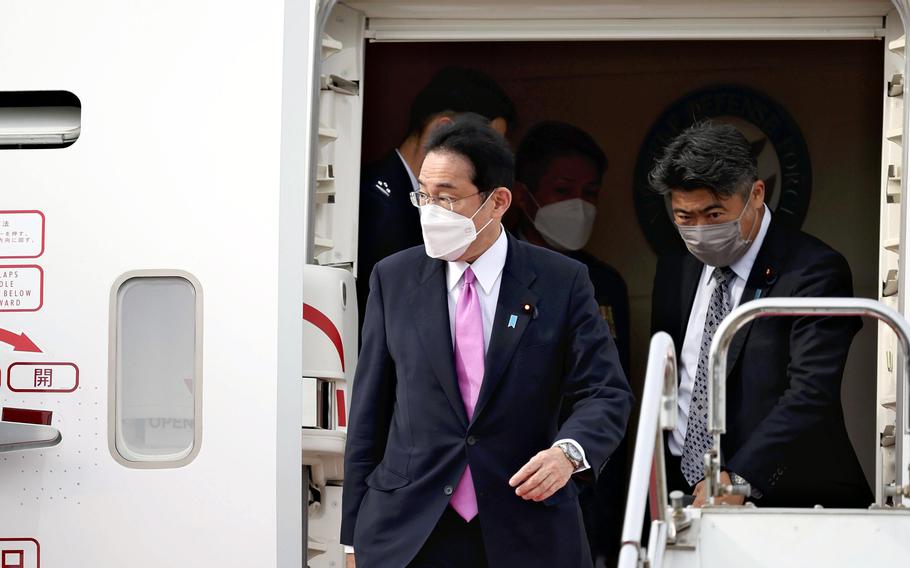Asia-Pacific
US, Japan launch bid to put first Japanese astronaut on moon
Bloomberg May 23, 2022

Prime Minister Fumio Kishida arrives at Haneda Airport following visits to Southeast Asia and Europe in May. Following a meeting Monday in Tokyo between President Joe Biden and Japanese Prime Minister Fumio Kishida, the U.S. and Japan said in a joint statement they’d collaborate on human and robotic moon missions “including a shared ambition to see a future Japanese astronaut on the lunar surface,” with a goal of signing an implementation agreement this year. (Japan News-Yomiuri)
The US and Japan agreed to work to put the first Japanese astronaut on the moon, accompanied by an American astronaut, as the longtime allies develop a partnership aimed at countering China.
The two countries said in a joint statement they'd collaborate on human and robotic moon missions "including a shared ambition to see a future Japanese astronaut on the lunar surface," with a goal of signing an implementation agreement this year.
Following a meeting Monday in Tokyo between President Joe Biden and Japanese Prime Minister Fumio Kishida, the countries also said they "are committed to a Japanese astronaut opportunity on the Gateway, a human outpost in the lunar vicinity, as part of expanding Artemis collaboration."
The joint lunar exploration development ties into the Artemis project, a US-led effort to return astronauts to the moon and eventually send humans to Mars.
US-Japanese space cooperation "is taking off, looking toward the moon and to Mars," Biden said Monday at a press conference with Kishida.
"I'm excited about the work we will do together on the Gateway Station around the moon and look forward to the first Japanese astronaut joining us in the mission to the lunar surface, under the Artemis program," he added.
The US and Japan are seeking to work more closely on space exploration after NASA officials warned of growing tensions between Washington and Beijing.
Monday's news comes amid the race to start extracting potentially hundreds of billions of dollars' worth of resources on the moon and elsewhere.
The moon may contain large amounts of helium-3, an isotope potentially useful as an alternative to uranium for nuclear power plants because it's not radioactive. Experts believe 5,000 tons of coal could be replaced by about three tablespoons of helium-3.
The geopolitics of space mirrors the competition between the US and its allies against China and Russia. The world's top superpowers have been struggling to agree upon a common set of rules to govern the next generation of space activity.
Japan and South Korea are among 19 countries that have agreed to support the Artemis Accords, a non-legally binding set of principles for exploration of the moon, Mars and beyond.
But China and Russia have led opposition to the accords. They are jointly promoting an alternative project on the moon they say is open to all other countries: the International Lunar Research Station.
Japan itself has one of the world's most advanced space programs, and in 2020 the Japan Aerospace Exploration Agency succeeded in bringing back material from an asteroid using the unmanned Hayabusa2 probe.
About a dozen Japanese nationals have experienced space travel, putting the country roughly even with China, Germany and France, but far behind the US and Russia in the global rankings. The country's space budget jumped by more than 20% to about 450 billion yen ($3.5 billion) last year.
The lack of cooperation between the US and China on space exploration is particularly dangerous in an era where the cosmos are becoming more crowded, and billionaires like Elon Musk and Jeff Bezos are increasingly launching satellites to delve into commercial opportunities.
Japanese e-commerce billionaire Yusaku Maezawa spent time on the International Space Station last year in preparation for becoming the first private passenger on a planned trip around the moon on Musk's SpaceX in 2023. No Japanese citizens have actually landed on the moon.
NASA in April conducted tests for the launch of Artemis I, a fully robotic mission to the moon — the first since Apollo 17 in 1972. China is swiftly moving toward a goal of matching US capabilities. China is the only country to operate its own space station, and last year became only the second nation after the US to land a rover on Mars.
US legislation first passed in 2011 prevents NASA from most interactions with its Chinese counterpart, and the US has blocked China from taking part in the International Space Station — a move that simply prompted Beijing to build its own.